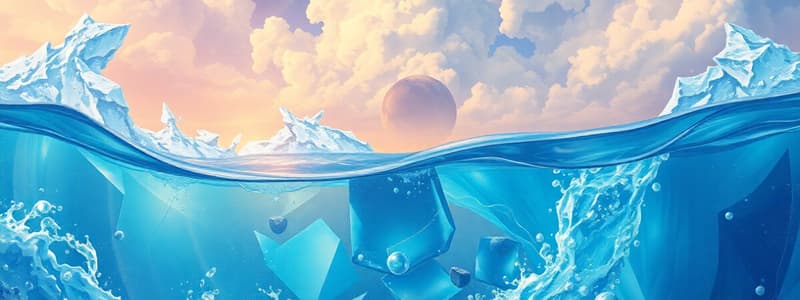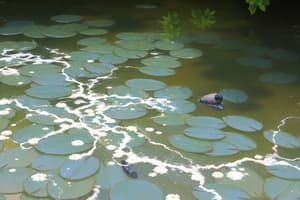Podcast
Questions and Answers
At what temperature does water boil and change from liquid to gas?
At what temperature does water boil and change from liquid to gas?
- 0 °C
- 100 °C (correct)
- 150 °C
- 50 °C
Which process involves water changing from solid to liquid?
Which process involves water changing from solid to liquid?
- Melting (correct)
- Condensation
- Evaporation
- Boiling
During which process is energy released?
During which process is energy released?
- Evaporation
- Freezing (correct)
- Melting
- Boiling
What is the process called when liquid water turns into gas at temperatures below the boiling point?
What is the process called when liquid water turns into gas at temperatures below the boiling point?
Which state of water occurs at 0 °C during the process of freezing?
Which state of water occurs at 0 °C during the process of freezing?
Which statement is true regarding the energy changes during the freezing of water?
Which statement is true regarding the energy changes during the freezing of water?
At which temperature does the transition from liquid to gas occur during boiling?
At which temperature does the transition from liquid to gas occur during boiling?
What is the phase change called when water vapor condenses into liquid at temperatures below the boiling point?
What is the phase change called when water vapor condenses into liquid at temperatures below the boiling point?
Which process does NOT require energy to be absorbed?
Which process does NOT require energy to be absorbed?
Which state of water is achieved when energy is absorbed at temperatures below the boiling point?
Which state of water is achieved when energy is absorbed at temperatures below the boiling point?
Which statement is true regarding the temperature at which water transitions from gas to liquid?
Which statement is true regarding the temperature at which water transitions from gas to liquid?
During which state change is energy absorbed and at what point does this occur?
During which state change is energy absorbed and at what point does this occur?
What process is described when liquid water releases energy to become solid ice?
What process is described when liquid water releases energy to become solid ice?
Which of the following processes involves absorption of energy at a specific temperature?
Which of the following processes involves absorption of energy at a specific temperature?
At what temperature does liquid water change into gas during boiling, and what is the corresponding energy change?
At what temperature does liquid water change into gas during boiling, and what is the corresponding energy change?
Flashcards
States of Water
States of Water
Water can exist in three forms: as a solid (ice), a liquid (water), and a gas (water vapor or steam).
Melting
Melting
The process where a solid (ice) transforms into a liquid (water) by absorbing heat energy. This occurs at 0°C (32°F), also known as the melting point.
Boiling
Boiling
The process where a liquid (water) changes into a gas (steam) by absorbing heat energy. This occurs at 100°C (212°F), also known as the boiling point.
Freezing
Freezing
Signup and view all the flashcards
Condensation
Condensation
Signup and view all the flashcards
Study Notes
Water States and Changes
- Water exists in three physical states: solid (ice), liquid (water), and gas (water vapor/steam).
State Changes Table
- Melting: Solid (ice) changes to liquid (water) at 0°C (melting point). Energy is absorbed.
- Boiling: Liquid (water) changes to gas (steam) at 100°C (boiling point). Energy is absorbed.
- Evaporation: Liquid (water) changes to gas (water vapor) at temperatures below the boiling point. Energy is absorbed.
- Freezing: Liquid (water) changes to solid (ice) at 0°C (freezing point). Energy is released.
- Condensation: Gas (water vapor/steam) changes to liquid (water) at or below the boiling point. Energy is released.
Studying That Suits You
Use AI to generate personalized quizzes and flashcards to suit your learning preferences.



